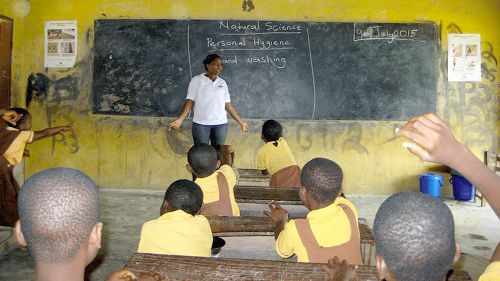
GES reforms structure - Exercise won't cause job losses
The Ghana Education Service (GES) is reviewing its structure to make the service more efficient and effective in the delivery of its mandate of providing quality, equitable and inclusive education for the Ghanaian child.
The reforms seek to look at the entire structure and spectrum of the service and restructure systems, as well as job functions, with a focus to improve and better manage them.
Addressing a workshop on the Secondary Education Improvement Project (SEIP) at Larteh in the Eastern Region, the Deputy Director-General of the GES in charge of Management Services, Mr Anthony Boateng, said one of the areas being considered was the number of people working at the GES Headquarters.
“Some people are of the view that the headquarters of the GES should be made of only highly technical people who will be engaged in policy dissemination, coordination, harmonisation and monitoring to ensure that things are working,” he said.
Eliminating duplication
Mr Boateng indicated that no employee would lose his/her job and urged staff of the service not to panic, stressing: “At worst, there may be realignments.”
Currently, the GES has a staff strength of about 350,000 and a student population of about nine million.
Mr Boateng said the service was looking at eliminating duplications to ensure efficiency and maximise the human resource available for effective delivery on the mandate.
He said as part of the ongoing reforms, the government had set up some bodies to take up some of the responsibilities of the GES to enable it to focus on its mandate.
He mentioned the National Council for Curriculum Assessment (NaCCA) as one of such institutions, adding that the council now developed the curriculum and handed it over to the GES and private schools to implement.
“So currently it is not the GES that determines which book goes to the schools. Anybody who wants to get his or her books into schools must contact the NaCCA to look at them and determine whether the books are worth being used in schools,” he explained.
Headteacher
Mr Boateng further said the reforms would also look at the possibility to strengthen the position of the headteacher and empower him/her to be able to sanction a teacher who did not come to school or who was not performing.
He explained that even though currently headteachers could sanction teachers, the procedure for arriving at a decision was cumbersome, such that “by the time the feedback comes, the issue might have lost its relevance”.
“So the idea is to determine when the school head can take a decisive action at the school to ensure that the school achieves the needed results,” he said.
Promotions
Touching on the promotion of teachers, Mr Boateng said the interview system for promotions had been stopped.
“As part of the changes being implemented, teachers now write aptitude tests to get promotion,” he said.
He, however, stressed that before being considered for promotion, the teacher would have to be assessed based on certain benchmarks to ascertain whether that teacher was eligible for the promotion.
For a teacher to be eligible for promotion, the person might have demonstrated some level of integrity, commitment and performance, as well as delivered effective teaching and learning in the classroom, he added.
